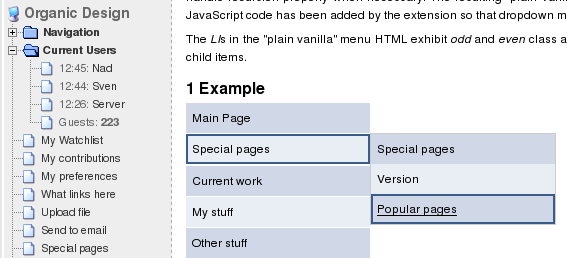News (blog)
4 April 2013[edit] | |||
| Posted by Nad on 5 April 2013 at 00:23 | |||
|---|---|---|---|
This post has the following tags: News
| |||
|
Organic Design move from US to Germany completed successfully![edit]The Organic Design sites have now been moved from Codero in the US to webgo24.de in Germany. We now have a faster 3.3GHz quad-core Xeon E3-1265L CPU (with 8 threads and 8MB L3 cache). We've also gone up from 4GB to 16GB of ECC RAM and from 250GB disk up to 1.8TB with raid-1 for extra data integrity. Pretty much all the software is exactly the same on the new server as the last one apart form two things, first we changed from Ubuntu 10 to Debian 6, and secondly we've changed our database server from MySQL to MariaDB. MariaDB is a drop-in replacement so that no configuration needs to be changed to migrate to it, and it has several advantages including better performance and flexible back-end storage options such as distributed "NoSQL" storage protocols. But most importantly for us is that MariaDB is 100% open source whereas MySQL has been getting less and less open source since it was bought by Oracle a few years ago. MySQL co-creator Michael "Monty" Widenius forked MySQL to create MariaDB, which has picked up momentum, being included by default in Fedora, Open SUSE, Slackware and Wikipedia.
|
25 December 2010[edit] |
| Posted by Nad on 24 December 2010 at 21:52 |
|---|
This post has the following tags: News
|
|
Merry Christmas![edit]Christmas again already?!! it seems like this year has whipped by quicker than any before! Maybe time is actually getting faster? Perhaps it's caused by strange emissions from the sun which are causing the decay rate of Carbon 14 to become quicker? The picture on the right is a flowering Pōhutukawa tree which is New Zealand's natural Christmas flower since they come into bloom in December.
|
11 October 2007[edit] |
| Posted by Nad on 10 October 2007 at 11:23 |
|---|
This post has the following tags: News
|
|
Graphical Faq's[edit]One of the key objectives of Organic Design is to create community that supports the ideals espoused in our Manifesto. In light of that, Organic Design announces the launch of a new open-source mashup called Grafaq, or, "Graphic Faq." The purpose of this project is to 1) increase awareness of open source software, 2) lower the barrier to entry of open source software, and 3)improve the quality of learning materials available for open source software. To contribute to this project, please visit http://www.grafaq.com
Celestia[edit]I've been checking out a cool application this evening called Celestia which is a space simulation. It allows you to navigate around the solar system or galaxy and beyond and has amazing surface rendering of the planets taken from satellite imagery and can overlay clouds and atmosphere - it can even show the lights of our cities as shown in the image to the right. By default it runs at the current time, but you can speed time up as much as you like and watch how the planets and moons move in their orbits and you can even make time go backwards. Information can be overlaid such as names, orbits and constellations. If you plan on having a go, read the documentation first, because knowing how to navigate with the mouse and keys makes a big difference to your Celestia experience ;-) |
20 January 2012[edit] |
| Posted by Nad on 21 January 2012 at 12:48 |
|---|
This post has the following tags: News
|
|
SOPA postponed![edit]A controversial American anti-piracy act was recalled on Friday, which came as no small victory for hacktivists who launched history's largest attack on several websites -- including that of FBI -- in protest of the Stop Online Piracy Act. Those opposing the controversial law have grown jubilant, with many seeing Friday's news as real victory in a sort of war for online freedom. The vote on the anti-piracy legislation, which was due on January, 24, has been postponed. Trevor Timm of the Electronic Frontier Foundation, a US-based international digital rights advocacy non-profit, confirmed to RT that the online protests over SOPA and PIPA were the biggest in Internet history, with over 115,000 sites somehow altering their webpages. See article and video on RT.com |
30 April 2008[edit] |
| Posted by Nad on 30 April 2008 at 23:07 |
|---|
This post has the following tags: News
|
|
Crackbot Alert![edit]After reading this Analyzing Malicious SSH Login Attempts article I decided to do some checking of our own logs (on Debian /var/log/auth.log is the one showing SSH login information), and there are many bots attempting to access our server via SSH just as there were on the Honeypot discussed in the article. In fact we've had around two thousand login attempts per day for at least the last few months! It looks like we've not had any successful attempts thanks to being strict with strong passwords, but the article suggests some simple things which will prevent most attacks from succeeding.
In addition to these things I also brought our server OS and software up to date which hadn't been done in quite a while, so many new security patches will have been applied during that process. |
11 October 2010[edit] |
| Posted by Nad on 10 October 2010 at 15:49 |
|---|
This post has the following tags: News
|
|
What We The People Need[edit]It's 4am and I can't sleep due to feelings of intense frustration :-( I was watching Eben Moglen's speech that inspired the Diaspora project, and realised anew how simple it would be for us, the open source community, to put together everything we need to create for ourselves complete independence from the oppressive financial forces that are eroding our freedom away every day. We need to get our knowledge decentralised asap - the net was designed to be a peer-to-peer network in the first place! we need to create a new independent and free virtual community of un-interruptible and un-censorable sharing of knowledge as a foundation. Then within that decentralised environment we need to carry on the development of further independence such as the ability to organise and trade together. The centralised model is not working for us, even sites like Wikipedia which are supposed to be made by the people are just riddled with corporate propaganda and are missing or twisting vitally important information such as cures for cancer, for example see the biased article on Cansema and its talk page. All the tools exist for what we need already, it just needs the will of the masses to push these ideas into critical mass of usage. For example the Git version control system is inherently peer-to-peer, and has a wiki plug-in. A suite of development tools could be added to Git to make a large development community like GitHub but in a completely peer-to-peer way.
|
17 April 2008[edit] |
| Posted by Nad on 18 May 2008 at 01:21 |
|---|
This post has the following tags: News
|
|
TreeAndMenu extension[edit]I've needed to create parser-functions a number of times which allow the rendering of dynamic menu's. Each time I've created a specific extension for the job and have used code from TreeView to achieve it, so finally I bit the bullet and merged the best JavaScript dynamic menu I've found (Sons of Suckerfish) into the TreeView code base, and renamed the extension from TreeView5 to TreeAndMenu. The TreeAndMenu extension allows bullet lists to be rendered as folder trees or dynamic drop-down menu's. It has been tested successfully on MediaWiki versions 1.6.10, 1.8.4, 1.9.3, 1.10.2, 1.11.0 and 1.12.0. And is known to work on Safari, IE6, IE7 and all Mozilla based browsers such as Firefox and SeaMonkey. Screenshot showing a tree on the left and a dynamic drop-down menu on the right
|
25 September 2010[edit] |
| Posted by Nad on 25 September 2010 at 03:45 |
|---|
This post has the following tags: News
|
|
Development update[edit]The Organic Design team have made a joint decision to move away from development and to focus on the higher level architectural aspects of the project. This will involve developing the platform specification to define a set of existing free and open source software solutions that work well together in delivering a complete organisational solution. We feel that we offer value best in the area of the overall structure and the content, such as procedures and documentation. Our passion lies ultimately in the development of the platform network which is a global group of peers that can form organically into larger decentralised bottom-up organisations as described in our manifesto. We'd like to move to an environment somewhat like Cyn.in from an interface perspective but including groupware, project management and basic accounting/invoicing. |
11 September 2008[edit] |
| Posted by Nad on 10 September 2008 at 23:59 |
|---|
This post has the following tags: News
|
|
Large Hadron Collider Up And Running![edit]
The Large Hadron Collider (LHC) is the world's largest and highest-energy particle accelerator complex, intended to collide opposing beams of protons (one type of hadron) charged with high energy. Its main purpose is to explore the validity and limitations of the Standard Model, the current theoretical picture for particle physics. It is theorized that the collider will confirm the existence of the Higgs boson, the observation of which could confirm the predictions and missing links in the Standard Model, and could explain how other elementary particles acquire properties such as mass. The LHC was recently completed and was run for the first time today. First beams were shot only a small way through, and when that worked without any problems a beam was shot all the way round which also worked perfectly without a hitch. The first high-energy collisions are planned to take place after the official unveiling on October 21. The LHC was built by the European Organization for Nuclear Research (CERN), and lies underneath the Franco-Swiss border near Geneva, Switzerland. It is funded by and built in collaboration with over eight thousand physicists from over eighty-five countries as well as hundreds of universities and laboratories.
|
29 June 2011[edit] |
| Posted by Nad on 29 June 2011 at 21:35 |
|---|
This post has the following tags: News
|
|
Friendly URL rules updated[edit]Our Mod-Rewrite rules have been updated today to fix a long-standing problem preventing image thumbnails from working for images that have ampersands in their names. The update also fixes the home page URL so that it's just the naked domain without any appended pagename. The rules are in our Subversion repository in the wiki.vhost file. For more details see our local Friendly URL's article and the Short URL page in the MediaWiki manual. |










